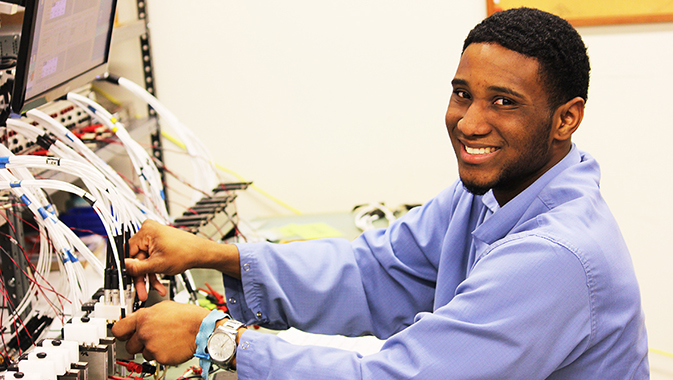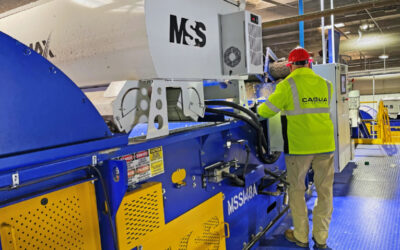Mini-Circuits is a designer, manufacturer and distributor of products for intermediate frequency, radio frequency and microwave signal processing. The company can produce large quantities on short notice and send them almost anywhere on earth that they are needed. Mini-Circuits’ product lines represent over 10,000 custom models and off-the-shelf products, while offering world-class quality, service and technical support to its customers.
~
Around the world, 1969 was a year of dramatic change. One of mankind’s greatest achievements was realized on July 20 of that year when the Apollo 11 lunar module landed safely on the surface of the moon. Astronaut Neil Armstrong said the now-legendary words: “That’s one small step for man, one giant leap for mankind.”
That same year, in the New York borough of Brooklyn, radio frequency engineer Harvey Kaylie was in his kitchen, working on his dream of founding a company specializing in radio frequency (RF), intermediate frequency (IF) and microwave signal processing products. Unlike the competition at the time, Kaylie wanted to manufacture high quality products at a competitive price while remaining profitable.
Forty-six years later, Mini-Circuits has retained its founder’s vision and has achieved a worldwide position of respect as a leader in the design, manufacturing and distribution of electronic components.
“For the entire forty-six years, Mini-Circuits has been owned and operated by one person,” says company President Ted Heil. “This is the ultimate in family entrepreneurship.” Funding the business by himself, Kaylie – who remains owner and chief executive officer to this day – has fostered an environment of employee, supplier and customer loyalty that is virtually unheard of.
“Anyone knowledgeable in the RF and microwave space is familiar with Mini-Circuits. We serve over 20,000 active customers. Any company that is doing anything in the space of RF and microwaves is probably buying something from us. And one man built it and ran it.”
Remaining true to its founder’s goal of providing quality components with value pricing, Mini-Circuits prides itself on providing RF and microwave products to a range of industries and remaining innovative at every step. The company is active in design, logistics and manufacturing and today boasts products designed into some of the most advanced applications of wireless technology being developed today.
With six product design centers, multiple core technologies and world-class product design capabilities, the Mini-Circuits’ business model remains as unique and innovative as the company itself. The company has about 2,500 employees worldwide and its North American operations include New York, Florida, Missouri and California, with other locations in Israel, England, China, India, Malaysia, Taiwan and Indonesia.
“We finance everything ourselves, and we have no bank debt for this expansion,” says Heil of the company, which owns its own facilities. Growth over the years has been done in a conservative, controlled and well-planned fashion, with an eye on sustainability in the long haul. “We are not publicly traded, so we have a strong measure of independence in our decisions and the way we run our business,” he says.
Mini-Circuits specializes in designing, manufacturing and distributing a range of RF, IF and microwave components and integrated modules covering application bands from DC to 40 GHz. The company offers twenty-seven different product lines to well-known clients in commercial, space, military and industrial applications. Its products are used in radio-frequency identification (RFID), cellular wireless, worldwide interoperability for microwave access (WiMAX), cable television (CATV) networks, satellites, aerospace transmitters and receivers – including communication and navigation systems onboard aircraft as well as Air Traffic Control systems – testing and measurement equipment, medical devices, and United States defense standard or ‘mil-spec’ equipment.
The company is known for its high quality products, innovative designs, rapid response, fast turnaround and on-time delivery as well as its loyalty to its customers. Many companies discontinue products often, even on a weekly basis. Mini-Circuits knows that some customers still use older products. The very first company product was the SRA-1 frequency mixer, which the company still manufactures to this very day. The little component is used in radio frequency receivers and communication systems for ship-to-shore and airplanes.
“In this day and age, companies don’t have very deep loyalties,” comments Heil. “But the fact that we still manufacture the SRA-1 for those companies who need it gives an indication of what loyalty Harvey has to his customers.” Although the company doesn’t make a profit from this particular product, it refuses to discontinue it, because it doesn’t want to leave customers without a supply.
On the company’s website, customers browse and search for a very wide range of products by product line, model search number or an advanced model search by performance parameters. Thousands of products are available from stock with thousands more engineering designs available by request. The company provides everything from amplifiers and attenuators to cables, couplers, transformers, splitter/combiners, switches, equalizers, oscillators, synthesizers, RF test solutions, and a great deal more!
Following a strict set of values, the company’s quality policy ensures it provides products and services that meet stated requirements and often surpass them. The company is continuously looking for ways to improve and is focused on becoming the world’s preferred company for RF, IF and microwave products by providing customers with products of superior value.
Its solid business model manages to balance profitability and value to the customer. “No customer out there wants you to be marginally profitable,” states Heil. “Why? Because then you are a risk for them. If you are financially unstable, if you are not profitable, you will not be a reliable supplier to anyone for any length of time. So, profitability is a sign of stability and longevity. Our customers are not looking for a supplier who can save them money today and may be out of business tomorrow.”
Well-known clients like Rockwell Collins are still building aviation radios used on Boeing 737s, which were put into production over twenty-five years ago, and these radio systems are still being serviced to this very day. As a result, industry giants do not want suppliers who will disappear due to financial instability.
“So profitability is not a four-letter word. It’s a good thing. You’d better be profitable, because if you’re not, you’re not going to be able to service your suppliers. For most of our surveys, customers are asking about the financial integrity of the business. We are not in the commodity space; we’re in the infrastructure space, and in the infrastructure space, there is more of a partnership with the customer.”
To remain current in the industry, Mini-Circuits makes considerable investment in its own automation equipment and is a very large purchaser of RF and microwave test equipment. It has developed its own robotic test handlers and fixtures for assemblies. Continually adding to its product lines, one of the company’s more recent introductions to its portfolio was a range of RF test solutions, which keeps growing and is serving a new niche for the enterprise.
Although it has eight locations currently, Mini-Circuits believes the best future investment is not in buildings, but the acquisition of technology to better serve its clients.
“We have great customer base,” says Heil. “We touch about 20,000 customers on an annual basis. That’s a fantastic reach. We also have a reasonably strong brand; it is one of the better brands in business.” He says that the company has the money to invest in new products but is quite choosy in doing so. “But everything that goes out, and I mean everything, must have the same level of quality, because it’s our reputation.”
The company sells parts with prices that range from $0.20 to $20,000, but quality is paramount regardless of cost. “People often talk about the cost of quality; Harvey talks about the savings of quality. Quality saves cost. Because you have such a highly-repetitive process, you don’t burn labor and yield, and that results in massive savings. And he built this whole company on that. The culture here is a culture of quality.”
With a talented team of designers, microwave engineers, software engineers and others with manufacturing engineering expertise, all aspects of production are supported from design to completion. The sophisticated supply chain and superior quality engineering ensures parts meet the company’s own rigorous internal standards for quality and reliability.
Mini-Circuits has been experiencing growth in a number of areas, with wireless telecommunications remaining the largest segment at about thirty percent of the company’s business and continues to be active in areas such as defense and military and commercial aerospace. “Every aircraft out there has got Mini-Circuits parts on it: in their radios, in their satellite systems and even in their Wi-Fi access,” states Heil, “and all use Mini-Circuits components. So there are a handful of major players worldwide in that space, and we sell to them all.”
The company’s fierce commitment to quality and value is reflected in the awards it has received on a regular basis for supplier excellence. Awards are based on several metrics, such as on-time delivery, performance, and quality, measured in part failures. With fewer than one hundred failures per million, Mini-Circuits’ fielded quality remains world-class, but the company is continuously striving to reach ever higher levels of excellence.
Following in the footsteps of its founder, Harvey Kaylie, Mini-Circuits is loyal to its core markets and its customer base. “The core values never change, because that’s the recipe,” says Heil. “But what you do is, you change the flavors, and that’s how we’ll have continued, steady growth.”













